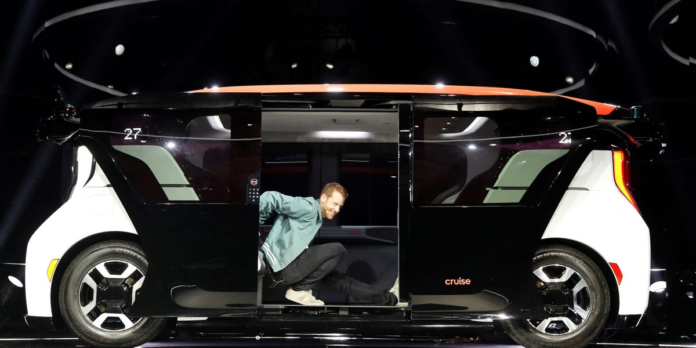GM’s Cruise is still pushing forward after Ford’s Argo called it quits.
Cruise is embarking on a commercialization push after years of R&D.
Profitability is not yet the marker of success for Cruise, GM president Mark Reuss said.
Sign up for our newsletter to get the inside scoop on what traders are talking about — delivered daily to your inbox. Loading Something is loading. Thanks for signing up! Access your favorite topics in a personalized feed while you’re on the go. download the app Email address By clicking ‘Sign up’, you agree to receive marketing emails from Insider as well as other partner offers and accept our Terms of Service and Privacy Policy
At a time when self-driving taxi services like Ford’s Argo are calling it quits, GM’s Cruise is in the autonomous vehicle business for the long haul, the automaker’s president, Mark Reuss, told Insider.
In fact, GM’s self-driving outfit is now embarking on the commercialization phase of its robo-taxi service, after a successful nighttime pilot in San Francisco earlier this year. Cruise is looking to offer rides in Austin and Phoenix, with plans to expand to more cities next year.
At the same time, Cruise continues to develop its purpose-built Origin autonomous vehicle, which executives have said opens more commercial opportunities for the business, like delivery, as well as shuttle-style ridesharing.
Going commercial does not mean becoming profitable, however. Running Cruise costs GM about $2 billion a year. Meanwhile, auto industry experts and executives caution that the tech is still in its infancy and is years away from mass commercialization.
In response to AV skeptics, Reuss said that Cruise is able to expand its offerings because the team has retained its focus.
“I don’t think it’s a good idea — particularly with R&D projects — to go in and out of it,” Reuss said. “You end up losing a ton of momentum.”
GM CEO Mary Barra told investors last month that the company would continue its current clip of spending on Cruise. GM and Cruise have not said when the self-driving car unit will start turning a profit.
That’s essentially the opposite approach from crosstown rival Ford, which last month gave up on its money-losing self-driving unit, Argo. That set off alarm bells for investors in the autonomous vehicle space, hammering AV startup stocks. The change in valuations is expected to drive a wave of consolidation in the self-driving startup space next year, according to industry analysts.
For Reuss, profitability isn’t the right marker of success for Cruise, at least not right now. Instead, designers and engineers are focused on meeting safety and comfort benchmarks as the service expands.




